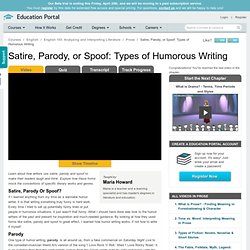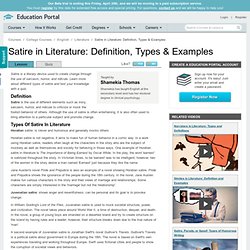

Jonathan Swift's A Modest Proposal: Summary, Analysis & Quiz. In this lesson you will learn what Jonathan Swift's 'A Modest Proposal' is about, what it means within the context of the British exploitation of Ireland, and the prevailing political perceptions of the time.

Summary 'A Modest Proposal' begins by deploring the sad fate of the poverty-stricken Irish who have to spend all their time trying to feed their large families. As a solution to the poverty in which these families are forced to live, by virtue of having so many mouths to feed, Swift suggests that these poor Irish families should fatten up their children and sell them to the rich English land owners. He argues that children could be sold into a meat market as early as the age of one, giving poor families some much needed income, while sparing them the expenses of raising so many children. Analysis With 'A Modest Proposal,' Swift makes fun of similar pamphlets that were being circulated at the time.
In the end, 'A Modest Proposal' is anything but modest. Introduction to Jonathan Swift: Biography, Gulliver and a Modest Proposal. Last revised: March, 2014 Acceptance of Terms Please read this Terms of Service Agreement ("Terms of Service", "Terms of Use") carefully.

These terms apply to Education Portal and its related websites owned and operated by Remilon, LLC ("Education Portal,", "Site", "Sites", "our", "us"). Logos, Ethos and Pathos: 3 Ways to Appeal to an Audience in Essays. Using Rhetorical Skills to Write Better Essays - Free College Composition Video. What is Rhetoric? - Definition, Devices & Examples. If you don't read this lesson, you'll never understand what rhetoric means!

That may or may not be true; it's probably just hyperbole. Read about the different definitions of rhetoric and some of its most popular means of persuasion. What the Thinkers Thought Sometimes one word can mean a lot of different things. Rhetoric is one of those words. Plato (c. 428-427 BC) Ancient Greek philosopher Plato defined rhetoric as, 'The art of winning the soul by discourse.' Aristotle (384 BC - 322 BC) Greek philosopher Aristotle, a student of Plato, argued that, 'Rhetoric is the faculty of discovering in any particular case all of the available means of persuasion.' Marcus Fabius Quintilianus (c. 35 - c. 100) Roman rhetorician Quintilianus had an entirely different take from the two Greek philosophers. How Emotion Influences Attitudes and Persuasion - Free Social Psychology Video. Last revised: March, 2014.

Satire, Parody, or Spoof: Types of Humorous Writing - Free Analyzing and Interpreting Literature Video. Last revised: March, 2014 Acceptance of Terms Please read this Terms of Service Agreement ("Terms of Service", "Terms of Use") carefully.

These terms apply to Education Portal and its related websites owned and operated by Remilon, LLC ("Education Portal,", "Site", "Sites", "our", "us"). Education Portal provides the Services, which are defined below, to you subject to the following Terms of Service, which may be updated by us from time to time without notice to you. BY ACCESSING, BROWSING OR USING THE SITE AND THE SERVICES PROVIDED THROUGH OR IN CONNECTION WITH EDUCATION PORTAL, YOU SIGNIFY AND ACKNOWLEDGE THAT YOU HAVE READ THE TERMS OF SERVICE AND AGREE THAT THE TERMS OF SERVICE CONSTITUTES A BINDING LEGAL AGREEMENT BETWEEN YOU AND EDUCATION PORTAL, AND THAT YOU AGREE TO BE BOUND BY AND COMPLY WITH THE TERMS OF SERVICE. Privacy Policy Education Portal respects your privacy and permits you to control the treatment of your personal information.
Terms Applicable to All Services a. I. Satire in Literature: Definition, Types & Examples. Satire is a literary device used to create change through the use of sarcasm, humor, and ridicule.

Learn more about different types of satire and test your knowledge with a quiz. Definition Satire is the use of different elements such as irony, sarcasm, humor, and ridicule to criticize or mock the foolish behavior of others. Although the use of satire is often entertaining, it is also often used to bring attention to a particular subject and promote change.
Types of Satire in literature Horatian satire: is clever and humorous and generally mocks others Horatian satire is not negative; it aims to make fun of human behavior in a comic way. Jane Austen's novel Pride and Prejudice is also an example of a novel showing Horatian satire. Juvenalian satire: shows anger and resentfulness; can be personal and its goal is to provoke change.